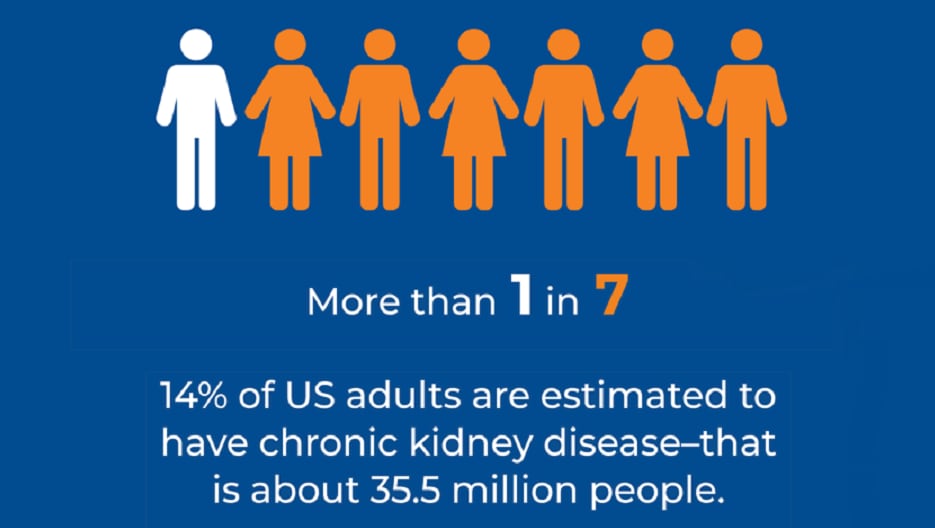Chronic Kidney Disease in the United States, 2023 (original) (raw)
With chronic kidney disease (CKD), kidneys become damaged and over time may not clean the blood as well as healthy kidneys. If kidneys don't work well, toxic waste and extra fluid accumulate in the body and may lead to high blood pressure, heart disease, stroke, and early death. However, people with CKD and people at risk for CKD can take steps to protect their kidneys with the help of their health care providers.
Findings
Download the full report
This page provides select findings from the report. View the entire report here.
Fast stats
- More than 1 in 7 US adults—about 35.5 million people, or 14%—are estimated to have CKD.†
- As many as 9 in 10 adults with CKD do not know they have it.
- About 1 in 3 adults with severe CKD do not know they have CKD.
CKD by age, sex, and race/ethnicity
According to current estimates:†
- CKD is more common in people aged 65 years or older (34%) than in people aged 45–64 years (12%) or 18–44 years (6%).
- CKD is slightly more common in women (14%) than men (12%).
- CKD is more common in non-Hispanic Black adults (20%) than in non-Hispanic Asian adults (14%) or non-Hispanic White adults (12%).
- About 14% of Hispanic adults have CKD.
†How estimates were calculated for this page and full report: Percentage of CKD stages 1–4 among US adults aged 18 years and older using data from the 2017–March 2020 National Health and Nutrition Examination Survey based on 2021 CKD Epidemiology Collaboration GFR estimating equation, including serum creatinine, age, and sex. CKD stage 5 (that is, kidney failure) was not included. Severe CKD refers to stage 4. These estimates were based on a single measure of albuminuria or serum creatinine; they do not account for persistence of albuminuria or elevated creatinine as indicated by the Kidney Disease Improving Global Outcomes recommendations. Thus, CKD in this report might be overestimated. Estimates by sex and race/ ethnicity were age-standardized using the 2010 US Census population; the overall percentage is unadjusted. The number of adults with CKD stages 1–4 was estimated by applying the overall percentage to the 2019 US Census population aged 18 years and older. Blood pressure–lowering medicines included angiotensin-converting enzyme inhibitors and angiotensin II receptor blockers; blood sugar–lowering medicines included GLP-1 receptor agonists, SGLT2 inhibitors, and DPP-4 inhibitors; diagnosed diabetes was self-reported.
Percentage of US Adults Aged 18 Years and Older With CKD,* by Age, Sex, and Race/Ethnicity
Suggested citation
Centers for Disease Control and Prevention. Chronic Kidney Disease in the United States, 2023. Atlanta, GA: US Department of Health and Human Services, Centers for Disease Control and Prevention; 2023.
Get email updates
Sign up here to get the latest CKD data and stats delivered directly to your inbox.
May 14, 2024
